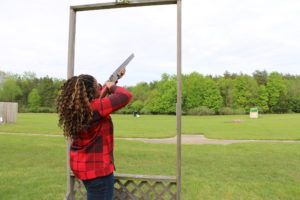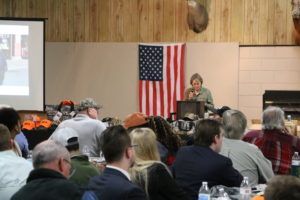Bipartisan event fosters understanding and commitment to Michigan’s sportsmen and women
Michigan legislators and members of the Michigan Legislative Sportsmen Caucus gathered at the Capital Area Sportsmen’s League for a night of outdoor activities and wild game feasting on May 21.
The Afternoon Outdoors & Wild Game dinner was a huge success, bringing in 16 legislators representing all different areas of the state and both major political parties.
Hunting and fishing has an economic impact of $11.2 billion dollars according to a study commissioned by Michigan United Conservation Clubs. This event provided an opportunity for legislators to see the importance of the industry and why the outdoor heritage in Michigan and across the country needs to be conserved and protected.

Rep. Leslie Love (D-Detroit) takes aim at a clay pigeon
Rep. Leslie Love (D-Detroit), a co-chair of the Michigan Legislative Sportsmen’s Caucus, is rather new to the world of sportsmen and women.
“As co-chair of the bipartisan and bicameral Michigan Legislative Sportsmen’s Caucus, I have taken the opportunity to sample the many outdoor activities sportsmen and women enjoy in Michigan — from shooting to fishing,” Rep. Love said. “The recent dinner in Lansing offered a wide variety of outdoor activities. Michigan ranks first among the Great Lakes states for jobs created from hunting and fishing activity-related purchases, and it’s an important economic sector.”
After the outdoor festivities, there was a wild game dinner featuring elk loin, duck and pheasant stir-fry, venison meatloaf, mashed potatoes with squirrel gravy, and wild mushroom and rabbit rice. The Michigan Wildlife Council gave a presentation explaining the importance of connecting with non-hunters and the perception of hunting and angling among Michiganders.

Carol Rose, a member of the Michigan Wildlife Council, speaks about building bridges between consumptive and non-consumptive users.
The event was put on by the Michigan Legislative Sportsmen’s Caucus Advisory Council, made up of sportsmen and women organizations across the state.
Amy Trotter, executive director of Michigan United Conservation Clubs, said working both sides of the aisle to achieve conservation victories is vital to conservation now and in the future.
“This event shows that protection of our natural resources is not a partisan effort. Today, we had members from both sides of the aisle side by side shooting sporting clays and eating game and fish,” Trotter said. “Having a hands-on opportunity for our legislators to experience the outdoors is vital to us. They have a tangible experience to walk away with and an understanding of what we do as conservation organizations.”
Organizations represented at the event included National Wild Turkey Federation, Safari Club International, Michigan United Conservation Clubs, Ducks Unlimited, Quality Deer Management Association, Michigan Trappers and Predator Callers Association, North American Versatile Hunting Dog Association and Trout Unlimited.
Recent Posts



